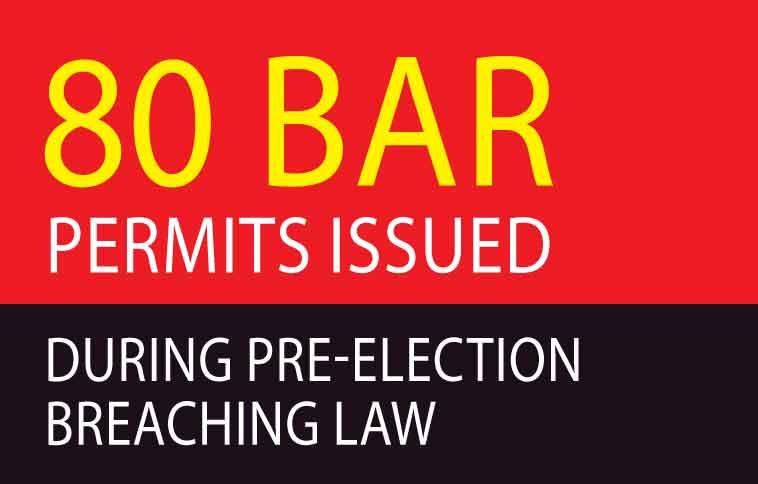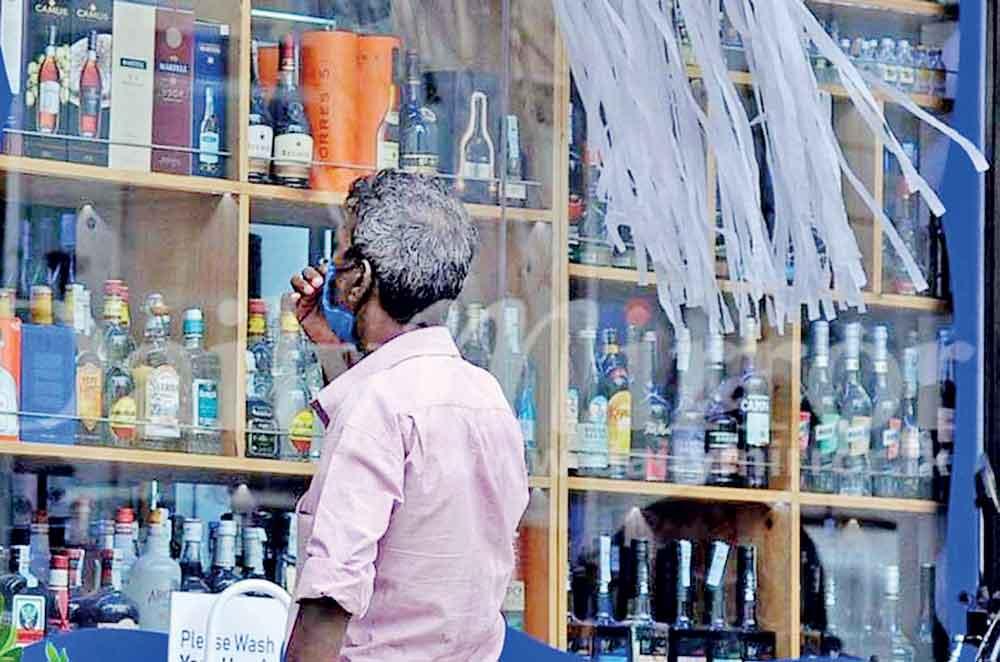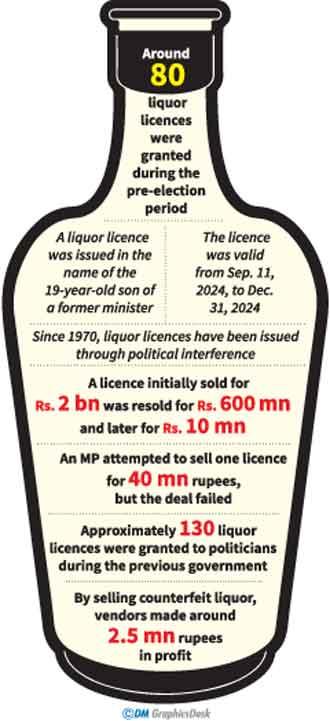08 Oct 2024 - {{hitsCtrl.values.hits}}


Liquor licences are a special privilege, with specific procedures required for their issuance
| Liquor produced by a manufacturing company in Kandy is transported to a liquor outlet in Polonnaruwa, with a truckload sent on Friday afternoon selling out by Saturday. By selling this counterfeit liquor, the vendors make around 2.5 million rupees in profit. Officials from the Excise Department pointed out that both liquor smugglers and excise authorities are involved in these fraudulent activities. Therefore, nobody comes forward to stop these activities |
 It has been revealed that Members of Parliament who promised support to the former government in the run-up to the presidential election were granted liquor licences to sell foreign liquor as a reward for the loyalty promised. Additionally, there are allegations that the independent candidate in this year’s presidential election, who also served as finance minister, was involved in issuing these licences. Some officials from the Excise Department of Sri Lanka has expressed concerns, stating that it is inappropriate for a finance minister to issue liquor licences when he is also a presidential candidate.
It has been revealed that Members of Parliament who promised support to the former government in the run-up to the presidential election were granted liquor licences to sell foreign liquor as a reward for the loyalty promised. Additionally, there are allegations that the independent candidate in this year’s presidential election, who also served as finance minister, was involved in issuing these licences. Some officials from the Excise Department of Sri Lanka has expressed concerns, stating that it is inappropriate for a finance minister to issue liquor licences when he is also a presidential candidate.
 Liquor licences are a special privilege, with specific procedures required for their issuance. The finance minister grants these licences with the involvement of the Commissioner General of Excise. However, in the last presidential elections, the finance minister was also a candidate for the presidency which made it highly unethical to grant such privileges under these circumstances. According to the election law, this move amounts to bribery. Furthermore, the Supreme Court had issued an interim order to halt the issuance of liquor licences during the election period. A complaint was lodged with the Election Commission of Sri Lanka, which subsequently intervened to conduct an on-site inspection and halt the issuance of licences.
Liquor licences are a special privilege, with specific procedures required for their issuance. The finance minister grants these licences with the involvement of the Commissioner General of Excise. However, in the last presidential elections, the finance minister was also a candidate for the presidency which made it highly unethical to grant such privileges under these circumstances. According to the election law, this move amounts to bribery. Furthermore, the Supreme Court had issued an interim order to halt the issuance of liquor licences during the election period. A complaint was lodged with the Election Commission of Sri Lanka, which subsequently intervened to conduct an on-site inspection and halt the issuance of licences.
Despite existing regulations, liquor licences were issued on September 18, 19, and 20, after the presidential elections had been announced. It has been revealed that around 80 licences were ‘granted’ during this period. One of these licences was issued in the name of the 19-year-old son of a former minister representing the Kurunegala district. The licence was made valid from September 11, 2024, to December 31, 2024. Investigations by elections authorities confirmed that the former minister’s son was born in 2005. Additionally, two district councilors from Kurunegala and Colombo, representing the Samagi Jana Balawegaya, received letters of recommendation for the issuance of liquor licences on the condition that they would appear on stage at ruling party meetings. However, excise officials confirmed that they were not granted the licenses as they did not attend the ruling party meetings.
| There are allegations that the independent candidate at this year’s presidential election, who also served as finance minister, was involved in issuing these licences |
| Excise Department of Sri Lanka has expressed concerns that it is inappropriate for a finance minister to issue liquor licences when he was also a presidential candidate |
|
A copy of a liquor licence
|
During the election season, liquor licences have been unlawfully issued to private businessmen, the private secretaries of ministers, and the spouses of secretaries. The law prohibits the issuance of liquor licences to employees or producers of liquor manufacturing companies. However, the managing director of a liquor manufacturing company has been granted a licence to sell liquor in Kothmale under the name of a private company. Investigations have revealed that these licences also were issued in violation of the law.
It has also come to light that around 80 liquor licences were indirectly obtained by politicians during the run-up to the presidential elections. The licences were not issued in the politicians’ names. These licences were granted to their relatives and coordinating secretaries. Those who received these licences sold them. A licence initially sold for Rs 2 billion has been resold for Rs 600 million and later for Rs 10 million. Although letters were issued stating that these licences would be sold, not many individuals have come forward to claim them.
| Furthermore, the Supreme Court had issued an interim order to halt the issuance of liquor licences during the election period |
On September 26, six letters necessary for obtaining liquor licences were taken. The former government issued liquor licences within the statutory boundaries; treating them as special privileges under the Excise Ordinance. In such cases, the process for selecting eligible individuals for these licences should be conducted legally. However, it has been revealed that there was no transparency when issuing these liquor licences.
| Despite existing regulations, liquor licences were issued on September 18, 19, and 20, after the presidential elections had been announced |
These licences were granted by the Presidential Secretariat, and the Director General of Excise was also informed. Several Members of Parliament have submitted applications for liquor licences. One such licence, obtained by a councilor representing Kandy, was sold to a licence holder in Digana. Investigations revealed that the MP in question received three licences, and an attempt to sell one for 40 million rupees failed. Additionally, a well-known bootleg liquor producer purchased one of the licences from the politician representing Kandy. It is reported that the black money earned by these individuals has been laundered through these transactions.
| The former government issued liquor licences within the statutory boundaries; treating them as special privileges under the Excise Ordinance |
Profits through counterfeit liquor
The investigations further revealed that although laws govern the Excise Department, fraud and corruption persist due to the manner in which these laws are applied. Liquor produced by a manufacturing company in Kandy is transported to a liquor outlet in Polonnaruwa, with a truckload sent on Friday afternoon selling out by Saturday. By selling this counterfeit liquor, the vendors make around 2.5 million rupees in profit. Officials from the Excise Department pointed out that both liquor smugglers and excise authorities are involved in these fraudulent activities. Therefore, nobody comes forward to stop these activities, according to these officials.
| After 1994, all existing licences were revoked, and new licences were again granted based on political affiliations. Those who did not receive licences for 5 years filed legal action, and they regained their licences |
Approximately 130 liquor licences have been granted to politicians during the previous government, in addition to those issued to private owners. Investigations have revealed that the commission fees from these licences have been paid to former influential ministers.
Liquor licences have been issued from May 1, 2023, up until now, with many being unlawfully granted during the election period. A comprehensive investigation is currently underway, but it has been reported that the Excise Department of Sri Lanka is withholding information from investigating officers regarding these licences. However, the legal framework necessary to revoke these illegal licenses is being prepared.
| One such licence, obtained by a councilor representing Kandy, was sold to a licence holder in Digana |
When granting liquor licences, the location for issuing the licence is usually selected and published in a newspaper, inviting eligible applications. Licences are then issued to individuals chosen among the applicants. However, this system longer exists. Since 1970, liquor licences have been issued through political interference. In 1977, the Excise Ordinance was amended under Section 28(b) to cancel licences improperly granted due to political influence. Yet, despite the amendment, licences were still issued in 1985-1986 in violation of the Ordinance.
| The legal framework necessary to revoke these illegal licenses is being prepared |
After 1994, all existing licences were revoked, and new licences were again granted based on political affiliations. Those who did not receive licences for 5 years filed legal action, and they regained their licences. However, those who did not pursue legal action were not reissued licences. A system has since been established to reissue licences, and a circular was passed in Parliament to address the issue. According to this circular, those who lost their licences after 1994 have had them reissued, which was after showing the five-year validity of these licences.
However, since 1994, new licences have been issued under the pretext of granting licences to those who lost their licences. This is clearly stated in the application for obtaining licences. It is mentioned that when applying for licences, those who lost their licences after 1994 are receiving licences that are more than five years old. Investigations have revealed that new licences have been issued in the past under this pretext.
According to investigating officers, it has been confirmed that the previous government has bypassed the legal system by issuing liquor licences through a new circular.
At present, no system exists for selecting eligible individuals for these licences. Officials of the Excise Department of Sri Lanka themselves pointed out that there are flaws in the system, that was previously established. It was believed that Excise Gazette Notification No 902, issued in 2008, would resolve these issues, but this has not been the case. From 2019 to 2022, political influence continued to affect the issuance of liquor licences. Investigations have also revealed that the method by which the 2008 Gazette was implemented is flawed. Although a new gazette was proposed to amend it, Parliament did not pass it; leaving Gazette Notification 902 still in effect.
This newspaper reached out to the Excise Commissioner General, J. M. Gunasiri, regarding the allegations of issuing illegal alcohol licences. When this scribe took a telephone call to this institute an officer informed us that the Commissioner General was at a meeting and suggested we call back in 10 minutes. However, when this newspaper called again, there was no response. This writer made several attempts to contact the Commissioner General directly, but was unable to reach him.
| During the election season, liquor licences have been unlawfully issued to private businessmen, the private secretaries of ministers, and the spouses of secretaries. The law prohibits the issuance of liquor licences to employees or producers of liquor manufacturing companies. However, the managing director of a liquor manufacturing company has been granted a licence to sell liquor in Kothmale under the name of a private company |
Additionally, this newspaper attempted to contact Channa Weerakkodi, the Excise Commissioner – Law Enforcement, on his mobile phone to inquire about the alleged irregularities in the granting of licences, but received no response.
Although the Excise Commissioner General and Channa Weerakkodi did not respond to our calls, the opportunity to make responses to this story remains open for both officials.
25 Dec 2024 9 hours ago
25 Dec 2024 25 Dec 2024
25 Dec 2024 25 Dec 2024